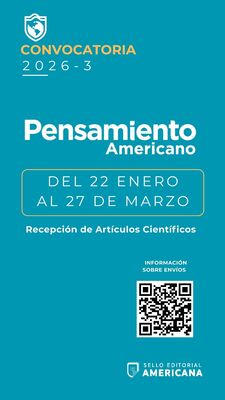Guidelines for the construction of a critical curriculum as a basis for transformation from school
DOI:
https://doi.org/10.21803/penamer.14.27.458Keywords:
Curriculum, autonomy, trainingAbstract
Introduction: The new humanity challenges deserves contributions from schools, specifically, from these curricular guidelines; based on a critical proposal that promotes a conscious citizenship, capable of having the knowledge and preparation to face the policies of standardized curricula, which have alienated the human being from ethical, moral, fraternal and solidarity values before the educational models. This separates citizens from the economic and environmental processes effects. Objective: This research article was created with the objective of proposing guidelines for autonomous training, from a critical perspective, in students from schools. Method or methodology: Its methodology was based on a qualitative research, taking into account an action research approach, focused on permanent communication between the different actors in the educational process; this is due to the school crisis after the imposed policies from the hidden entities that have allowed categorize educational quality from a competences and achievements perspective. Results: The information was obtained from different focus groups of the different government schools; similarly, observations were obtained from 3 educational institutions by observation inside and out class.
Downloads
References
Barraza, N. (2018). El Currículum, Análisis y Reformulación del Concepto. Dictamen Libre, 1(22), 113–118. doi: https://doi.org/10.18041/2619-4244/dl.22.5032
Correa, C. (2004). Currículo Dialógico, sistémico e interdisciplinar. Editorial Magisterio.
D´ Ángelo, O. (2004). Autonomía integradora y transformación social: El desafío ético emancipatorio de la complejidad. CIPS, Centro de Investigaciones Psicológicas y Sociológicas.
Elliot, J. (1990). La investigación - acción en Educación. Edición Morata.
Freire, P. (1971). Conciencia crítica y liberación. Editorial Camilo.
Freire, P. (2012a). La educación en la ciudad. Editorial Siglo XXI.
Freire, P. (2012b). Pedagogía del oprimido. Editorial Siglo XXI.
García, L. & Ramírez, M. (2013). Pedagogía Crítica y comunicaciones: Una mirada sobre los jóvenes escolares. Comunic@red 1(1). 217-244.
Giroux, H. (1990). Los profesores como intelectuales. Paidós.
MacLean, P. (1978). The Triune Brain Evolution. Plenun Press. México: Grijaldo.
Molinos M. (2002). Concepto y Práctica del currículo en John Dewey. Ediciones Universidad de Navarra, Pamplona (4). 416. https://doi.org/10.15581/004.4.206.
Observatorio De Educación del Caribe Colombiano. (2016, 2 de agosto). En Barranquilla la Educación está de Primera. https://www.uninorte.edu.co/web/blogobservaeduca/blogs/-/blogs/en-barranquilla-la-educacion-esta-de-primera
Sánchez, N., Sandoval, E., Goyeneche, R., Gallego, D & Aristizábal, L. (2018). La pedagogía crítica desde la perspectiva de Freire, Giroux, y McLaren: su pertinencia en el contexto de Colombia y América Latina. Revista Espacio 39(10). 41.
Torres, J. (2006). Globalización e interdisciplinariedad: El currículo integrado. Ediciones Morata.
Toruño, C. (2020). Aportes de Vigotsky y la pedagogía crítica para la transformación del diseño curricular en el siglo XXI. Innovaciones Educativas, 22(33), 186-195. https://doi.org/10.22458/ie.v22i33.3043.
Verdeja, M. (2019). Concepto de educación en Paulo Freire y virtudes inherentes a las orientaciones para una escuela intercultural. Contextos: Estudios de humanidades y ciencias sociales 42. 7-7.
Vygotsky, L. (1998). Teorías Vygotsky y Piaget: Desarrollo del niño y del Adolescente.
Yuni, Y & Urbano, C. (2005). Mapas y herramientas para conocer la escuela: investigación Etnográfica e investigación-acción
Downloads
Published
Versions
- 2021-05-01 (5)
- 2024-06-12 (4)
- 2021-06-01 (3)
Issue
Section
License
Copyright (c) 2021 Pensamiento Americano

This work is licensed under a Creative Commons Attribution-NonCommercial-NoDerivatives 4.0 International License.
The author or authors of an article accepted for publication in the Journal Pensamiento Americano will transfer all of the patrimonial rights to the American University Corporation free of charge, within which are included: the right to edit, publish, reproduce and distribute both print media as digital, in addition to include in article in international indexes and / or databases, likewise, the Editorial Seal is authorized to use the images, tables and / or any graphic material presented in the article for the design of covers or posters from the same magazine. By assuming the patrimonial rights of the article, it may not be partially or totally reproduced in any printed or digital media without its express permission.
AUTHORITY ASPECTS
For the Pensamiento Americano Journal, all the authors of an article have made substantial contributions to the research and the manuscript, and they share the responsibility when the article presents errors, fraud in some way or violations of copyright.
After submitting an article, the journal does not accept the addition, deletion or change in the order of the authors, in addition we reserve the right to release the article when it has been submitted to the journal and under no circumstances will American Thought accept the article. withdrawal of an article during any phase of the editorial process





